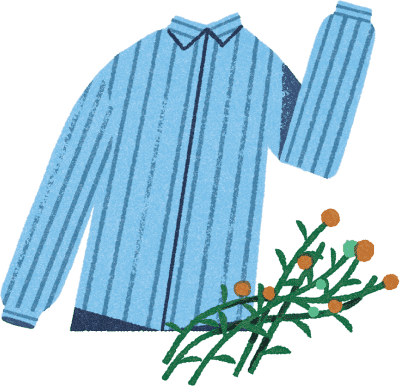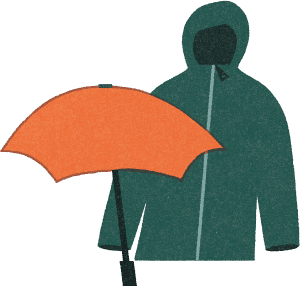LifeWear
and
the
Future
Vol.03
Clothing and the
Environment
LifeWear can be a link between our world
and the next generation. How exactly
do clothes affect the environment?
What can you do today to help?

Professor at Kyoto Institute of Technology. Distinguished visiting professor at Keio University Graduate School of Media and Governance. PhD from London’s Royal College of Art. Research focuses on the intersection of fashion and design, especially the ways that design influences society.

After serving as fashion director for Wallpaper magazine, Curtis was editor in chief of Elle UK from 2017 to 2019. In 2021, she founded The Calendar, a new style of media outlet blending high fashion and ecology.
LifeWear
and
the
Future
Vol.03
Clothing and the
Environment
LifeWear can be a link between our world
and the next generation. How exactly
do clothes affect the environment?
What can you do today to help?
Professor at Kyoto Institute of Technology. Distinguished visiting professor at Keio University Graduate School of Media and Governance. PhD from London’s Royal College of Art. Research focuses on the intersection of fashion and design, especially the ways that design influences society.

After serving as fashion director for Wallpaper magazine, Curtis was editor in chief of Elle UK from 2017 to 2019. In 2021, she founded The Calendar, a new style of media outlet blending high fashion and ecology.

How Clothes Impact the Environment
In what ways does clothing leave its mark on the environment?
The apparel industry makes and sells clothes for people to purchase and wear. As simple as it may sound, this framework has put great strain on the environment. What exactly is the current situation, and what can each of us do to make things better? For answers, we spoke with Daijiro Mizuno, professor at the Kyoto Institute of Technology, and Anne-Marie Curtis, former editor in chief of Elle UK and founder of The Calendar magazine, a media outlet focused on sustainability. Let’s take a look at three ways the environment is being impacted.
Greenhouse Gas Emissions
These are the gases that give rise to climate change. CO2 released while operating cars and planes or other machinery and burning trash or fossil fuels creates a large portion of emissions. While it’s impossible to go through daily life without contributing somehow to this dilemma, the situation is beginning to exceed tolerable levels, as demonstrated by rising average annual temperatures. The apparel industry is a major contributor. “Globalization has led to textile manufacturing, garment assembly, and sales all happening in different locations, requiring long-distance shipment from country to country. It’s customary for new products to be introduced each season, and when consumers toss away the old for the new, they’re tacitly agreeing with this framework,” explains Daijiro Mizuno. Even after a purchase is made, we generate further emissions through washing and drying, ironing, and having items refinished or repaired. Is there any hope of a solution? “We can pick items that don’t require resource-intensive maintenance, like things that can be washed by hand,” says Mizuno, “and we can take care of the things we do buy to ensure they’ll last.”
Environmental Pollution
The clothing industry also heavily contributes to pollution of the water and soil. Rivers and streams are polluted by agrichemicals that maximize the yield of cotton, as well as large quantities of wastewater generated by the chemical processes involved in dyeing and applying water-resistant treatments to fabric. And although regulations have been strengthened as awareness has increased, Mizuno says that “a variety of substances generated in the leadup to a product being sold put extra strain on the environment,” such as single-use shipping materials used for transporting items.
Misuse of Resources
The fashion world revolves around seasonal collections. Production is geared to match anticipated trends, but when these guesses fail, huge inventories can go left unsold. If no one ever wears these clothes, the resources it took to make them have essentially been wasted. Same goes for when consumers throw clothes away after just a season or two, simply because they’ve gone “out of style.” “Europe has now banned the disposal of unsold clothes, while Japan’s Ministry of the Environment expects available landfill space to be used up by 2040,” says Mizuno. “It’s widely thought among producers and consumers that excessive inventory and disposal are a necessary evil, but it’s high time this view is reconsidered.” If makers begin to manufacture products with a goal of selling out, consumers will need to reframe their relationships with what they own and establish a new system of values. How might this change the world?
Action for the Future
Whether it’s buying, wearing, or letting go of clothes, there are lots of ways to help.
Choose clothes you’ll want to fix
There’s a concept called emotionally durable design. It refers to things that make us want to use them and take care of them for a long time. “Purchasing physically durable items that speak to who we are helps to slow down the consumer cycle,” says Mizuno. “Choose high-quality, practical items you’ll wear for a long time,” says Anne-Marie Curtis. Denim and waxed canvas, for instance, will improve with age if properly maintained.
Pick simple designs
Ornaments like lace trim, studs and sequins or other fragile parts can shorten a garment’s lifespan. Opt for items that are easy to wash and dry.
Customize

Mending or embellishing torn or stained clothes gives them a new chance at expressiveness. “Try switching up the buttons on your jackets or shirts,” suggests Anne-Marie. “This can make an old item feel like a new and unique piece.”
Handwashing

Detergents impact the environment as well. Spot-cleaning sullied areas not only uses less polluting chemicals, it’s easier on clothes, making them last longer. “I won’t use any dryer that runs the risk of damaging my clothes,” says Anne-Marie.
Consider sharing

Clothes can be shared with friends and family in the same spirit that formal clothes are rented out for special occasions. “It could be fun for groups of friends to get together for a sharing party,” says Anne-Marie.
On-demand shopping
Using services that print custom products, like original T-shirts, is another way to limit waste.
Consider materials
Fertilizers are a main source of pollution, but the natural textile linen uses almost none, growing best when left to the sun and rain. Synthetics made from recycled materials are another resource-conscious choice.

Fertilizers are a main source of pollution, but the natural textile linen uses almost none, growing best when left to the sun and rain. Synthetics made from recycled materials are another resource-conscious choice.
Reuse
How can your clothes be put to a new use? It’s fun to think up different ways. They might be salvaged for the fabric and made into something new, or torn apart for rags and used for cleaning. “Use your imagination and keep it fun, the way fashion should be,” says Anne-Marie. Start with the things that you enjoy. These little efforts go a long way.

How can your clothes be put to a new use? It’s fun to think up different ways. They might be salvaged for the fabric and made into something new, or torn apart for rags and used for cleaning. “Use your imagination and keep it fun, the way fashion should be,” says Anne-Marie. Start with the things that you enjoy. These little efforts go a long way.
Secondary distribution
If you’re parting with clothes, see if there’s a way for someone else to wear them. This could mean donating to a thrift store or giving them away. You can also get your own clothes through these channels.
Clothing drives
When an item’s life is over, find a recycling box so that the fabric can be reclaimed. “If you simply toss clothes in the garbage, the textiles can’t be recycled,” cautions Mizuno.

When an item’s life is over, find a recycling box so that the fabric can be reclaimed. “If you simply toss clothes in the garbage, the textiles can’t be recycled,” cautions Mizuno.
Taking Action for the Future
“It’s important to foster a dialogue between producers and consumers,” says Anne-Marie Curtis. “When consumers speak up, producers are more likely to take action.” So what is UNIQLO doing to help? Here’s how the company is handling the three areas.
Addressing Greenhouse Gas Emissions

Most emissions are produced between procuring raw materials and shipping products to stores, accounting for 94.6% (with respect to items sold inside Japan. Source: Ministry of the Environment “FY 2020 Survey on Fashion and Environment”). How can we bring this number down? One way is by setting targets for procurement and production, making a plan, and monitoring our progress. In addition to increasing the efficiency of shipment from the factories, we’ve introduced energy-saving measures at stores throughout Japan, foremostly the Maebashi Minami IC store, where skylights bring natural light into the space and solar panels on the roof generate power.
Addressing Environmental Pollution

As you can see from glancing at the tags on our clothes. To make sure customers feel at ease buying our products, we thoroughly monitor production and ensure that factories have the latest equipment. One recent change is the introduction of water-repellent materials free from PFAS, which are organic fluorides that don’t easily break down in nature. A goal set in 2013 came to fruition in the 2017 fall and winter season, after which PFAS have not been used in any outerwear or folding umbrellas. We’ve also implemented guidelines specifying what we want and expect from our production partners, including the selection of appropriate chemicals, their safe use in factories, and the appropriate treatment of wastewater.
Addressing the Misuse of Resources

Have you spotted the carts at UNIQLO stores where reduced-price items can be found? This helps products to be sold even after the season is over. It’s one of several ways UNIQLO has committed to not throwing clothes away. We also monitor demand to avoid generating excessive inventory in the first place. Controlling stock and listening to what customers have to say helps us to develop and improve our products. The information customers share at the stores each day is a huge source of inspiration.
Current benchmarks and the latest data on how the company is moving towards these goals can be found on the UNIQLO website.
- Illustrations by Yuki Maeda
- Text by Miyuki Sakamoto
Release dates vary depending on the product. All listed prices, current as of February 5th, include sales tax and are subject to change.

























